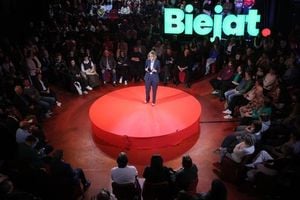Berlin – Robert Habeck, the Green Party's chancellor candidate, has announced he will not pursue any leadership roles within the party following disappointing results from the recent Bundestag election held on February 11, 2025.
At a press conference, Habeck stated, "I will not claim or strive for any leading role within the Green Party’s personnel tables anymore." This statement underscored his dissatisfaction after the Green Party garnered only 11.6% of the votes, down from 14.7% during the last election.
Reflecting on the campaign, Habeck said, "It was a great campaign, but it’s not a good result; I wanted more, and we wanted more." His remarks come as the party contemplates its future role, with many members discussing the shifting political climate and the potential need for reevaluation.
During the election campaign, the Green Party faced significant challenges, not only from the declining voter support but also due to what Habeck described as disturbing shifts within the political discourse. He expressed alarm over the normalization of terms like "remigration" used by political opponents, such as the AfD, which he condemned as dangerous trends. "It's frightening to see political opponents apply terms like 'remigration' as if they are completely normal," he said. This shift, according to Habeck, signals troubling developments within German politics.
Despite the Green Party’s poor showing, the election highlighted complex dynamics among political factions. While the Green Party did lose votes, their losses were less severe compared to their former coalition partners, the FDP and SPD, indicating different societal attitudes heading toward the party. Nevertheless, the challenge now lies in what direction the Green Party will take in the aftermath of the election.
Habeck believes the electoral results may have reflected voter backlash against the Union's association with the AfD. He stated, "I believe many people said: 'Not with Friedrich Merz and not governing with the Union' after they voted alongside the AfD." This perception could have adversely affected the Green Party’s support, as voters reassessed their affiliations based on recent political events and alliances.
The outlook for the Green Party remains uncertain as it contemplates its next steps. Some party leaders, including leaders Franziska Brantner and Felix Banaszak, have indicated they plan to continue their roles, but there is likely to be considerable pressure for change and revitalization within the party ranks.
With Habeck stepping back from leadership, the question looms: What will be his role moving forward? Although re-elected to the Bundestag, he left open whether he would take up the mandate, hinting at possible retreat from active politics. His decision may open space for other party members, particularly as the Greens regroup and reassess their strategies for future engagement.
The immediate future of the Green Party, as well as Habeck's personal political future, will hinge significantly on upcoming discussions on their direction and operational structures. How effectively they navigate post-election dynamics will have lasting consequences for their role within German politics and the broader European political framework.



